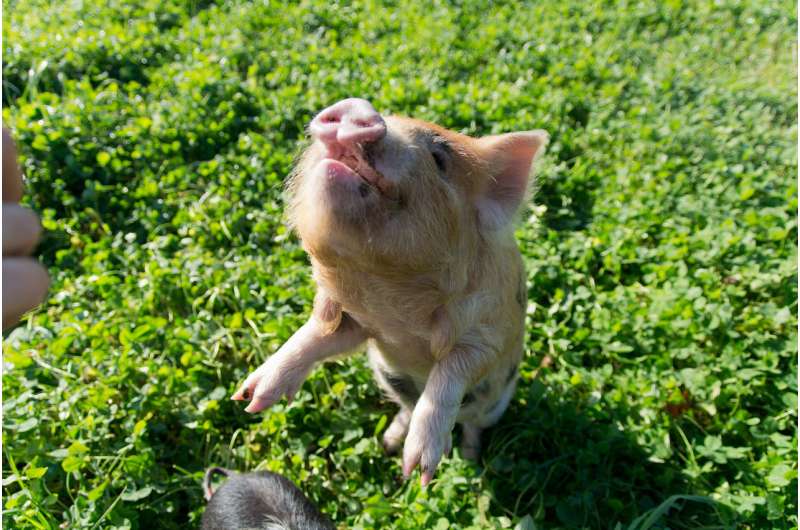Kune Kune piglets possess social learning skills and have an astonishingly good memory

Pigs are socially competent and capable of learning. But the combination of these two skills, i.e. learning by observing others, has been insufficiently studied so far. The exact copying and understanding of demonstrated actions – something that would indicate highly developed learning abilities – could not yet be proven. A new study with Kune Kune pigs conducted by cognitive researchers from the Messerli Research Institute of Vetmeduni Vienna, could now show for the first time that these animals do in fact learn from each other – in this case from their mother or their aunt. The intelligent animals also possess a remarkable long-term memory once they have internalized a technique. The results were published in the journal Animal Behaviour.
Pigs are not commonly considered to be especially intelligent. Several individual trials, however, have shown them to be very capable of learning and making decisions. In combination with their pronounced social competence, it can therefore be assumed that the animals may also possess social learning abilities. The few studies published on this learning aspect, however, have not yielded any clear results so far.
Pigs in these tests merely showed that they would search for food in places where other pigs had eaten previously. While this is evidence of socially facilitated attention, it does not demonstrate any highly developed learning abilities. The animals would have had to copy a complex behaviour of another pig or understand the objectives and intentions of a demonstrator, for example with regard to the manipulation of objects.
A new study conducted by cognitive researchers from the Messerli Research Institute of Vetmeduni Vienna has now shown that pigs, contrary to previous findings, do in fact possess highly developed learning abilities through observation. The researchers proved that free-ranging piglets of the New Zealand breed Kune Kune attentively observed and replicated tasks demonstrated by their mother or an aunt.
Learning from one's elders
The objective of the study was to demonstrate social learning through the "vertical transmission of information", i.e. the passing on of knowledge to the next generation. "In contrast to most previous studies, in which the animals learned from peers, the present study tested piglets after they observed their mother or their aunt in the process of solving a manipulative task," explains Ludwig Huber, the director of this Messerli Foundation-financed study. "The task involved opening the sliding door of a food box in order to get at a piece of food." The animals could use their snout to move the door to the left or right into one of three positions: left, right or middle.
Eighteen piglets were divided into three groups of six animals each. Two groups were placed in a separate observer compartment from which they could observe their mother or aunt as they used one of two possible opening techniques. The third group had to figure out the task without observation. The behaviour of this control group served as a test for any possible predisposition or bias regarding the movement of the sliding door.
Watch how mum does it - Piglets remember and copy demonstrated techniques
The findings from the trials showed that the non-observer piglets used all possible techniques, confirming that that there was no predisposition or bias. The observer piglets, on the other hand, exhibited true learning through observation, though they rarely copied the push position; for the most part, they copied the push direction or both direction and position together, so demonstrated object movement re-enactment. Interestingly, the piglets produced the best results when they were not tested for the learning effect until the next day. Apparently, they memorized what they observed and could correctly reproduce it when needed. Only rarely, and never before among pigs, has this remarkable behaviour been demonstrated among animals. Pigs, which have been paid little attention in learning research and are not regarded very highly among the general public, thus have a much higher importance for cognition research than had been previously believed.
Piglets also have a good long-term memory
The performance of the non-observer piglets was also remarkable. Animals in this group remembered a particular solution if they found one after a few attempts. A replication of the technique half a year later showed they could immediately recall the same solution. "That indicates a well-functioning long-term memory," says Huber.
The researchers believe that the talent for social learning among Kune Kune pigs is related to the way these pigs are kept. "The pigs live in natural family groups under free-ranging conditions. This appears to trigger an existing aptitude for social intelligence among these animals. It would be worthwhile to consider the positive effects of learning from older animals in commercial pig farming, for example when making improvements to the housing conditions."
The article "Object movement re-enactment in free-ranging Kune Kune piglets" by Ariane Veit, Marianne Wondrak and Ludwig Huber was published in Animal Behaviour.
Journal information: Animal Behaviour
Provided by University of Veterinary Medicine—Vienna

















